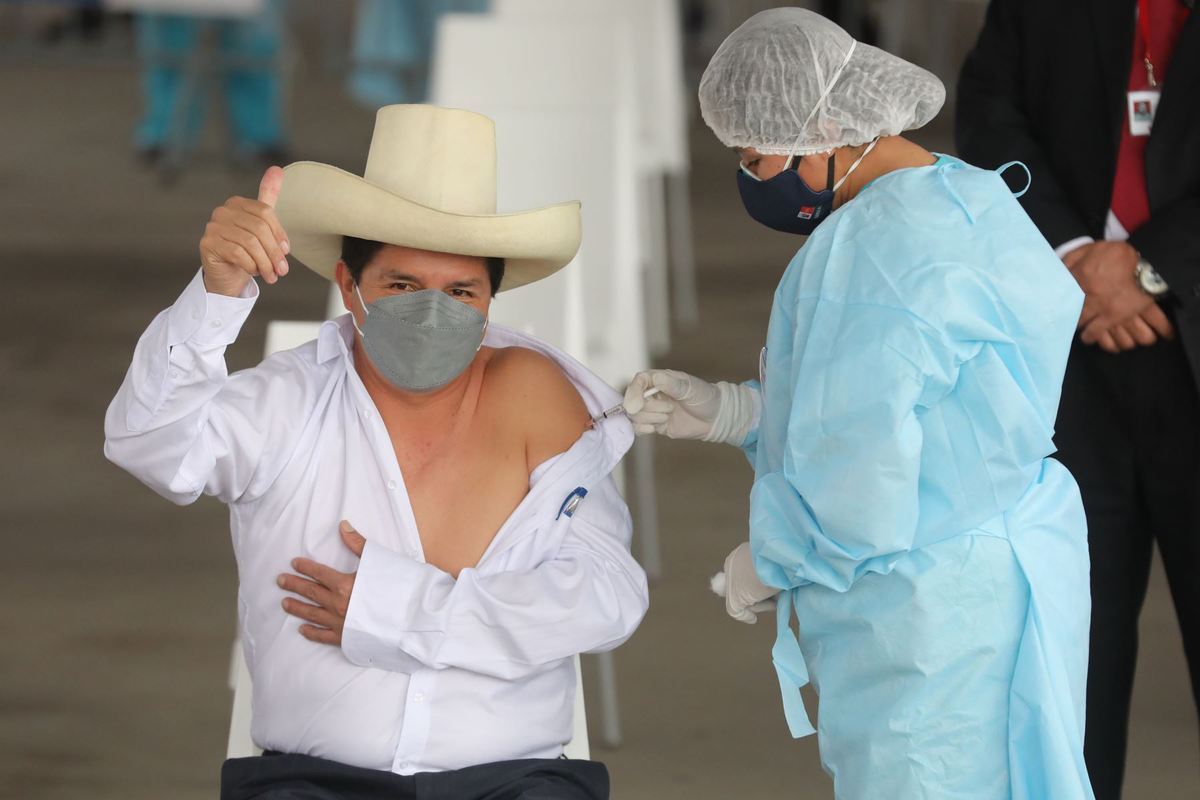
Peru's President Pedro Castillo receives a dose of China's Sinopharm COVID-19 vaccine in Lima, Peru, on August 6, 2021. [Photo/Xinhua]
Experts hail country's commitment to cutting emissions, fighting climate change
China is set to beef up its role as a provider of global public goods, including COVID-19 vaccines and its response to climate change, amid the rapid worldwide spread of the Delta variant and growing calls for global coordinated action in the face of multiple challenges, analysts said.
Meanwhile, the nation now has both the capacity and the willingness to provide more quality public goods that the world now urgently needs, they said.
China has acted on its promise to make its COVID-19 vaccines global public goods, having supplied 750 million vaccines to other nations as of August.
President Xi Jinping has renewed the commitment in a speech delivered at the first meeting of the international forum on COVID-19 vaccine cooperation, announcing that the nation will provide 2 billion doses of vaccines globally this year, in addition to making a $100 million donation to the COVAX global vaccine initiative.
Huang Tianlei, a research fellow at the Peterson Institute for International Economics, a think tank in the United States, said COVID-19 vaccine distribution needs to be made equal in order to bring the pandemic to an end, "as no one can truly be safe until everyone is safe".
Huang said the COVID-19 crisis occurs at a time of rising nationalism around the globe where beggar-thy-neighbor policies, such as vaccine nationalism and export restrictions on medical supplies, adopted by many governments, have resulted in a great shortage of the supply of global public goods.
"It is therefore critical that China expands its role in global public goods provision during the pandemic," he said.
"Obviously, COVID vaccines are among the most important global public goods the world urgently needs now. But COVID vaccines are still in short supply in many developing countries," said Huang.
He noted that China can play a more active role in improving the COVAX initiative, aside from what China has already been doing in terms of providing greater vaccine access.
"Improving the COVAX initiative and providing the developing world with greater access to effective vaccines can probably be a first step for China to forge a new global norm around vaccine distribution across the globe," he said.
Last month, China unveiled a $3 billion aid package to facilitate the pandemic response and economic recovery of developing nations.
Xu Xiujun, a researcher at the Chinese Academy of Social Sciences' Institute of World Economics and Politics, said China's provision of global public goods has been multidimensional, covering aspects such as materials, visions and mechanisms, with developing nations always being the focus.
With infrastructure development as a focal point, the nation has provided developing nations with a variety of infrastructure projects in transport, energy and public wellbeing, improving the accessibility of people in developing nations to basic public goods, he said.
In Africa, China helped with the maintenance and renovation of public facilities such as the Algiers Opera House in Algeria, the National Wrestling Arena and the Museum of Black Civilizations in Senegal, the Culture Palace of Abidjan in Cote d'Ivoire and the Cotonou Convention Center in Benin.
According to a white paper on China's international development cooperation released early this year, China has constructed a total of 423 projects for other developing nations, including 58 hospitals, 86 schools and another 60 public facilities.
The nation also started ahead of schedule the construction of the Africa CDC headquarters last year, as part of broader efforts to help Africa's response to COVID-19.
In addition, Xu said, the Five Principles of Peaceful Coexistence proposed by China have become a universally recognized norm for international relations, with the Belt and Road Initiative, the Asian Infrastructure Investment Bank and the Silk Road Fund contributing significantly to the improvement in global governance.
"When China offers public goods, it actively amplifies the common values of mankind-including peace, development, fairness, justice, democracy and freedom-safeguarding the common interests of human beings and endeavors to build a community with a shared future for mankind," he said.
Global agenda and BRI
Another key focus of China's public goods is to help the least developed nations attain the United Nations 2030 Agenda for Sustainable Development, including the elimination of hunger and poverty and ensuring access to quality healthcare and education.
By the end of 2019, China had dispatched 81 agricultural technology teams composed of 808 experts to 37 Asian and African countries, helping farmers increase productivity and boost their confidence in development. The country has also dispatched 3,588 medical workers overseas in 202 groups, offering treatment to 11 million patients, and has organized professional training for local medical workers and has donated medicines and equipment.
In Nepal, Armenia, Mozambique, Namibia, Peru and Uruguay, China assisted in building a number of primary and secondary schools and offered computers, lab equipment, stationery and sporting goods to improve basic education conditions.
Some analysts said that the BRI has become an immensely popular global public good, the largest platform for cooperation and a broad avenue for shared progress.
China has signed more than 200 cooperation documents with 140 countries and 31 international organizations.
(From the China Daily app)


